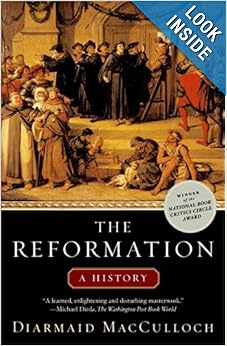I have been reading The Reformation: A History by Diermaid MacCulloch. One of the issues separating theologians and churches at the time was predestination. Some held that since God was omniscient and omnipotent, those people who would go to heaven were predestined to do so. Others held that people made their way to heaven through faith and actions. I don't have the background to argue the theology, but I have a couple of thoughts to share.
Complexity
Scientists tell us now that the universe is much, much larger and that it is much, much older than people in the 16th century could have imagined; scientists also suggest that it will last much, much longer into the future than those people imagined (and many of them believed the end of the world was immanent). Scientists have also discovered that a sub-atomic world exists in all that we can see and feel, and that it is smaller, stranger and more complex than people of the 16th century could have imagined. Moreover, scientists tell us that the things we can see and feel are only a relatively small part of the universe, and that there are large amounts of dark matter and dark energy.
There are now many times as many people living as were known to Europeans in the 16th century, they live longer and more complicated lives, and their number is growing. Scientists tell us that the species has been around for much longer than people in the 16th century would have understood, and most people now foresee the species lasting many millenniums into the future.
We have learned a lot about information and how it can be stored, accessed, and processed. For example, satellites have been recording data on the earth for decades. People have likened analysis of that data to trying to drink from a fire hose. The data is stored, much of it unanalyzed, but ready to be approached with powerful software and computers if specific information is required. Thus the data is organized and available, but there is much knowledge that might yet be gained from it.
Our view of the universe and mankind is so expanded and so changed, that we must understand terms such as "omniscient" and "omnipotent" quite differently than did people of the 16th century.
Determinism
Think of a sporting event on which people bet. There will be odds set on the outcomes before the event, based on their estimated probabilities. If you will, handicappers specify the likely probability of each alternative based on the information available before the event; the actual result depends not only on the abilities of the athletes, but on the evolution of the event -- chance events and the decisions made. The outcome is divided into two components, that which was probable a priori, and that which happened during the event that led to the a posteriori certainty of the result. People of the 16th century had no such concepts of statistical determinism.
Think now of a sports fan returning home from a day at work who is interested in a winter Olympic event. The results are available on the Internet when the fan arrives, but the event will not be broadcast on television for some hours. Some fans would check the Internet immediately to find the result, then watch the broadcast later; for others that would spoil the pleasure of watching the event and they would avoid learning the outcome in advance. In both cases, the information on the results would always be out in cyberspace available to the fan; in one case the observer would chose to know the result as soon as possible; in the other case the fan would prefer to know the result only after experiencing the event over time. I suspect our differentiation of having data or information and having knowledge is different than that of the people of the 16th century.
Thus I suspect that we moderns understand "determinism" and "knowledge" differently than did people in the 16th century. Thus we might have a different understanding of predestination than did people in the 16th century.

No comments:
Post a Comment